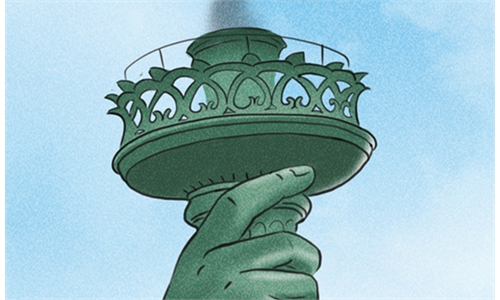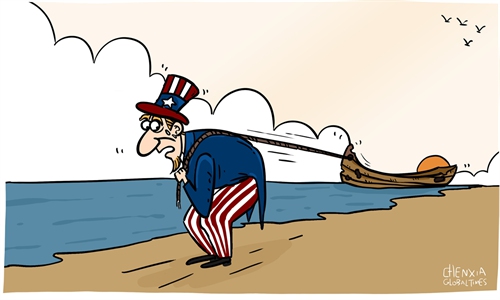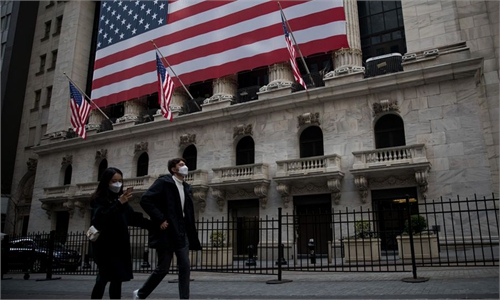COMMENTS / EXPERT ASSESSMENT
Biden’s 100 days in office: China-US ties remaining fraught

Illustration: Xia Qing/GT
US President Joe Biden will cross the 100-day mark of his presidency on Friday. As his China policy gradually takes shape, it seems he has adopted much of the Trump administration's wrong path, pushing the bilateral relationship further toward dangerous confrontation.
No matter what rhetoric the Biden administration is using, its animosity against China all stem from the ideology divergence, which actually consists of a fundamental mistake, because values shall not serve as the basis to run state-state relations.
A notable difference between Biden's approach from his predecessor's is gathering American allies around the world to impede China and to strangle China's technology development, which indeed places China under a severe international situation.
However, whether it is to ratchet up displaying its military muscle, or to discredit China on Xinjiang and Hong Kong, or to promote an Indo-Pacific strategy, the Biden administration's calculation is no more than force China to yield, but it obviously won't succeed in the end.
In terms of economic cooperation and trade, the Biden administration has not shown any willingness to restore normal business and trade ties with China. On the contrary, it tends to further push the decoupling agenda.
In a recent interview, US Trade Representative Katherine Tai indicated that the US doesn't have plans to remove Trump's tariffs on many Chinese products in the near future. The Biden government might plan to use tariffs as a leverage in future talks. However, coming through the Trump administration's brutal trade war, China has proven that it won't be pushed over, and it won't pin unrealistic hopes on the US on trade issue either.
China has earned itself a better position on the issues and basically can maintain the current strategy. Trade data from Chinese customs authorities showed that China's trade with the US rose 61.3 percent to reach 1.08 trillion yuan ($165 billion) in the first quarter, continuing a trend of China-US trade rebounding from an ebb last year triggered by Trump's trade war and exacerbated by the COVID19 outbreak.
Judging from this trend, China's exports to the US are expected to set a record this year, and would exceeded the level before the trade war, which proves the US' trade dependence on China. Even if Washington does not remove tariffs, it will only cause huge loss of American importers and consumers.
On the technology front, Biden has made it no secret to try all means to strangle China's technology growth.
Earlier this month, the US has continued its relentless sanctions on Chinese technology companies, added seven Chinese supercomputing firms to the sanctions list for conducting alleged activities that are contrary to the US national security.
Among a series of recent action plans, the US Senate Commerce Committee has reportedly hold a hearing on a bipartisan bill, titled the Endless Frontier Act, which is aimed at bolstering US technological research and development and to thwart China's development.
The US' technological suppression of China is obviously unreasonable and counterproductive. It has lagged behind in many areas including 5G. Further arbitrary crackdown will eventually hurt related fields in the US and promote China to improve its technological strength through independent development.
At the beginning of Biden's presidency, he called China the US' most serious competitor, and also said the US is ready to work with China when it is in its interests to do so. Judging from current situation, the US seems only plans to seek cooperation with China on climate change. Is it in America's interest only to cooperate with China on climate change?
With regard to economic and trade, technology and the fight against COVID-19, there still remain broad room for China and the US to promote cooperation, but the precondition is Biden correct the wrong course of its China policy. If the Biden administration stubbornly continue its wrong path and keep confronting China, while it will cause difficulty for China, the US will inevitably fail. Biden should draw a lesson from his predecessor's failure before it's too late.
The author is a former economic and commercial counselor at the Chinese Consulates General in San Francisco and New York, and a senior research fellow of the Chongyang Institute for Financial Studies at Renmin University of China. bizopinion@globaltimes.com.cn



